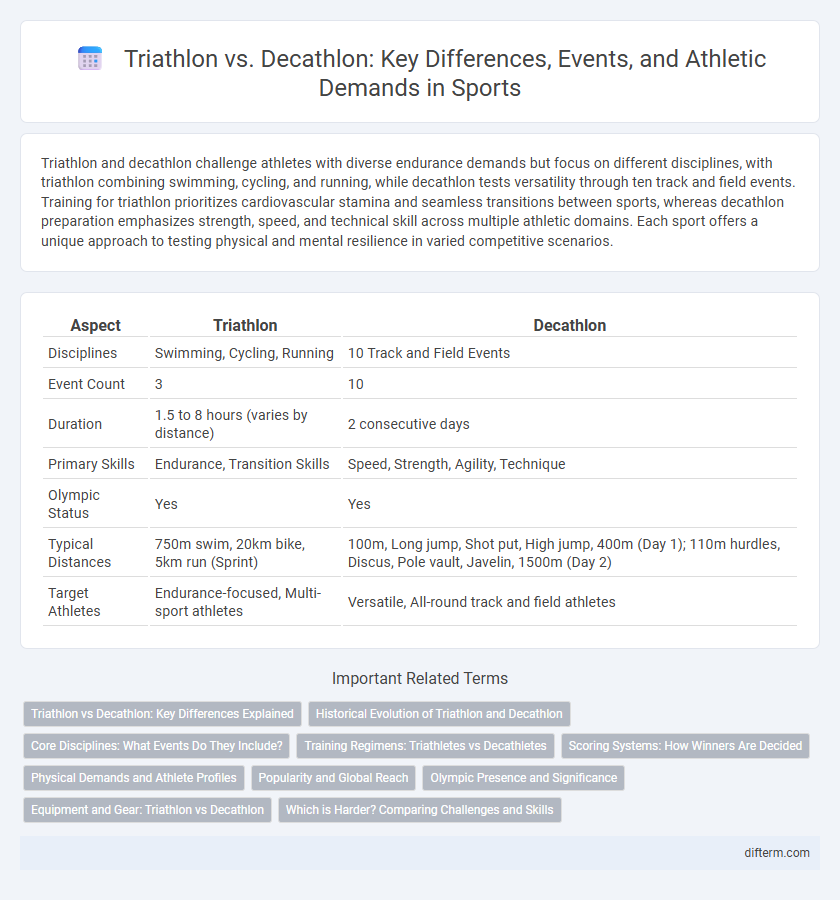Triathlon and decathlon challenge athletes with diverse endurance demands but focus on different disciplines, with triathlon combining swimming, cycling, and running, while decathlon tests versatility through ten track and field events. Training for triathlon prioritizes cardiovascular stamina and seamless transitions between sports, whereas decathlon preparation emphasizes strength, speed, and technical skill across multiple athletic domains. Each sport offers a unique approach to testing physical and mental resilience in varied competitive scenarios.
Table of Comparison
| Aspect | Triathlon | Decathlon |
|---|---|---|
| Disciplines | Swimming, Cycling, Running | 10 Track and Field Events |
| Event Count | 3 | 10 |
| Duration | 1.5 to 8 hours (varies by distance) | 2 consecutive days |
| Primary Skills | Endurance, Transition Skills | Speed, Strength, Agility, Technique |
| Olympic Status | Yes | Yes |
| Typical Distances | 750m swim, 20km bike, 5km run (Sprint) | 100m, Long jump, Shot put, High jump, 400m (Day 1); 110m hurdles, Discus, Pole vault, Javelin, 1500m (Day 2) |
| Target Athletes | Endurance-focused, Multi-sport athletes | Versatile, All-round track and field athletes |
Triathlon vs Decathlon: Key Differences Explained
Triathlon combines swimming, cycling, and running in a continuous endurance race emphasizing cardiovascular stamina and transition efficiency. Decathlon consists of ten track and field events including sprints, jumps, throws, and distance running, highlighting versatility across multiple athletic disciplines. Triathlon requires sustained aerobic performance, while decathlon demands a balance of speed, strength, and technical skill across diverse competitions.
Historical Evolution of Triathlon and Decathlon
The historical evolution of triathlon traces back to the early 1970s in Southern California, where athletes combined swimming, cycling, and running into a single endurance event that rapidly gained international recognition. Decathlon, originating in the early 20th century and formalized in the 1912 Olympics, consists of ten track and field events that test speed, strength, and agility, symbolizing the ultimate athletic versatility. Both sports evolved to train distinct physical and mental capacities, with triathlon emphasizing endurance across three disciplines and decathlon focusing on mastery of multiple athletic skills.
Core Disciplines: What Events Do They Include?
The triathlon comprises swimming, cycling, and running, demanding endurance across water and land disciplines. The decathlon includes ten track and field events: 100-meter sprint, long jump, shot put, high jump, 400-meter run, 110-meter hurdles, discus throw, pole vault, javelin throw, and 1500-meter run, testing a diverse range of athletic skills. Both competitions challenge athletes' versatility, but triathlon emphasizes continuous multisport endurance, while decathlon focuses on varied track and field proficiency.
Training Regimens: Triathletes vs Decathletes
Triathletes focus on endurance training across swimming, cycling, and running, emphasizing consistent aerobic conditioning and transition practice for seamless event changes. Decathletes require a diverse training regimen targeting speed, strength, power, and technique across ten track and field events, balancing skill development in sprints, jumps, throws, and middle-distance running. Both athletes prioritize recovery and periodization but tailor workouts specifically to their sport's event demands and energy systems.
Scoring Systems: How Winners Are Decided
Triathlon scoring is based on total time, combining swim, bike, and run segments, with the lowest aggregate time determining the winner. Decathlon uses a points system where athletes accumulate scores across ten track and field events, calculated through a complex formula evaluating performance in each discipline. This points-based scoring in decathlon allows comparison across diverse athletic skills, unlike triathlon's straightforward timed ranking.
Physical Demands and Athlete Profiles
Triathlon demands exceptional cardiovascular endurance and efficient energy management across swimming, cycling, and running, favoring athletes with strong aerobic capacity and muscular endurance. Decathlon requires versatile physical strength, explosive power, and technical skill across ten diverse track and field events, favoring athletes with a combination of speed, strength, and agility. While triathletes often specialize in prolonged stamina, decathletes develop broad athleticism to excel in multiple distinct disciplines.
Popularity and Global Reach
Triathlon has surged in global popularity due to its accessibility and inclusion in the Olympic Games since 2000, attracting millions of participants worldwide. Decathlon, with its rich athletic heritage and focus on versatility, maintains strong recognition primarily in Europe and North America but has a more niche following overall. The triathlon's steady growth in Asia and Australia outpaces the decathlon, reflecting broader international appeal and easier entry barriers.
Olympic Presence and Significance
The triathlon, introduced to the Olympics in 2000, combines swimming, cycling, and running in a single continuous race, emphasizing endurance and versatility. The decathlon, a traditional Olympic athletics event since 1912, tests an athlete's all-around skill across ten track and field disciplines, including sprints, jumps, and throws. While the triathlon highlights multisport stamina and rapid transitions, the decathlon represents the pinnacle of combined athletic ability within the Olympic Games.
Equipment and Gear: Triathlon vs Decathlon
Triathlon equipment centers on specialized gear for swimming, cycling, and running, including wetsuits, aerodynamic bikes, and lightweight running shoes designed for quick transitions. Decathlon gear varies widely across ten diverse track and field events, requiring shoes tailored for sprinting, jumping, and throwing, along with event-specific tools like javelins, shot puts, and pole vault poles. Athletes in triathlons prioritize versatile, multi-use items for endurance and speed, while decathletes require event-specific equipment to optimize performance in each discipline.
Which is Harder? Comparing Challenges and Skills
Triathlon demands exceptional endurance through continuous swimming, cycling, and running, emphasizing cardiovascular stamina and efficient energy management. Decathlon tests a broader skill set, requiring versatility across ten track and field events that include sprints, jumps, and throws, challenging strength, speed, coordination, and technical ability. The difficulty comparison hinges on whether sustained endurance or diverse athletic prowess presents a tougher challenge to the individual athlete.
triathlon vs decathlon Infographic

 difterm.com
difterm.com